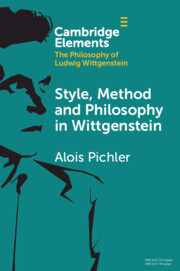Element contents
Style, Method and Philosophy in Wittgenstein
Published online by Cambridge University Press: 15 September 2023
Summary
- Type
- Element
- Information
- Online ISBN: 9781108955485Publisher: Cambridge University PressPrint publication: 12 October 2023
References
Primary Sources
Secondary Sources
- 10
- Cited by

